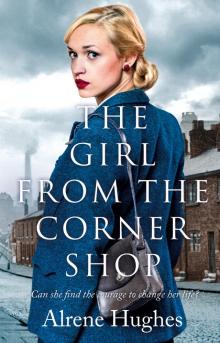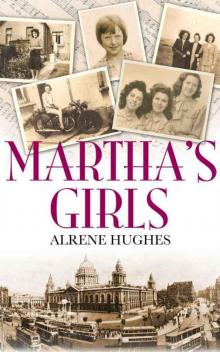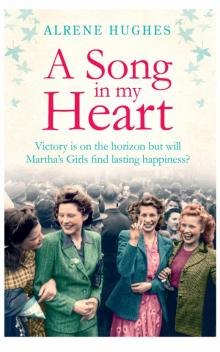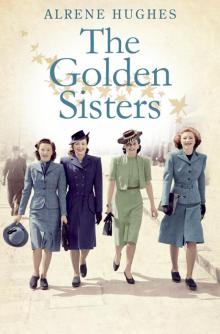- Home
- Alrene Hughes
A Song in my Heart Page 9
A Song in my Heart Read online
Page 9
‘Goes without saying, but it must be a voice that suits our repertoire and most of all it has to blend with our voices. That’s why in the audition they’ll have to sing by themselves and then with Pat and me.’
‘Sounds terrifying,’ said Esther.
‘And so it should be,’ said Peggy. ‘It’s not easy being a member of the Golden Sisters.’
Half an hour before closing time, the shop was already filling up with young women waiting to audition. Esther was given the job of taking their names while Peggy looked on, examining each new arrival: the confident and the nervous; the pretty and the plain; the well dressed and the shabby.
Pat arrived just before six. ‘It’s a good turnout,’ she said to Goldstein.
‘Indeed it is. We should find someone tonight. Right Peggy, I think we’ll get started with the solo singing and after that we’ll decide who should go home and who should stay to sing with you two.’
As one hopeful girl followed another, Goldstein, Peggy and Pat made notes and in most cases it was easy to spot those who were not suitable almost as soon as they stood in front of them. Sometimes it was to do with their presence, sometimes it was the quality of the voice. It wasn’t hard to agree on the six girls who would go on to the second audition.
Goldstein read out the names of those who had not been chosen and thanked them for coming. Then he announced that there would be a ten-minute break before the next stage of the audition when, in turn, they would sing ‘Don’t Sit Under the Apple Tree’ with the two Golden Sisters.
Pat was chatting with Peggy at the piano when she heard the shop bell ring and looked up to see Sheila in the doorway with a young man. ‘Well, I never,’ she said and Peggy followed her gaze.
Sheila was flushed and smiling as she introduced her companion. ‘This is Charles – he works at school.’ He was tall and thin and it occurred to Peggy that his clothes were certainly those of a schoolmaster. Pat, however, noticed that he was nervous, and from the way he looked at Sheila it was clear he was quite taken with her.
‘Have you chosen someone yet?’ asked Sheila.
Pat explained what was happening. ‘It’ll all depend on how they sound when they sing with us. But Mr Goldstein says if they’re not good enough we’ll have to carry on looking.’
‘Are you going to stay?’ asked Peggy. ‘You could tell us what you think.’
‘Oh, I wouldn’t have a clue,’ said Sheila. ‘We’ll just stay at the back there and listen.’
It was one thing to prepare an audition piece and deliver it to a good standard, but quite another to weave complex harmonies as a member of a trio. Pat and Peggy had sung together since they were children and their performances were instinctive. Added to that, there was the overall look of the three girls together to be considered.
One by one, the girls did their best: some managed the harmonies but didn’t look right; others had the glamorous looks but their singing didn’t blend well; and some had neither one thing nor the other. Throughout, Goldstein’s face gave nothing away and when the last girl had sung he asked Pat and Peggy to join him in his office to make their final decision. At that moment there were raised voices at the back of the shop.
‘But you have to do it.’
‘I … I don’t think I can—’
‘I’m telling you. You must!’
Goldstein had noticed earlier that Sheila and a young man had arrived to watch the auditions and, at the sound of their voices, he went to speak to them.
‘My name is Goldstein,’ he said to her companion. ‘And you are …?’
Charles stood up and offered his hand. ‘My name is Charles, sir, and I think Sheila should sing for you.’
‘She doesn’t need to sing. I know her voice very well and it’s not quite right for the Golden Sisters.’
‘I think you’ll find it is.’ Charles seemed to have found his confidence.
Goldstein was sceptical. ‘And how would you know that?’
‘Because I’ve trained her to sing the harmonies and I think you’ll find she is exactly what you’re looking for.’
Goldstein turned to Pat and Peggy, but they looked as puzzled as he was.
‘Is this true?’ he asked Sheila.
‘Yes,’ she said softly.
‘Well, this is highly irregular, but if the ladies who have auditioned don’t mind, I’d like to hear Sheila sing with the Golden Sisters.’
Sheila stood at the piano next to Pat, and Peggy played the intro to ‘Apple Tree’. At the end of the third bar, Pat turned to Sheila and smiled encouragement. But a minute later Goldstein shouted, ‘Enough of that. Now sing “Chattanooga Choo Choo” please.’
Again Peggy played the intro, the sisters sang and Goldstein listened intently. When they had finished, there was a spontaneous round of applause from everyone there. Goldstein, Peggy and Pat went to the office to discuss what they had heard.
Martha enjoyed the quiet evening on her own with her knitting and the wireless and only occasionally went upstairs to look out for her girls coming up the road. She told herself that Sheila must have gone to watch the auditions, but she would have words with her for not coming home for her tea first.
When she heard them coming round the side of the house talking and laughing she went into the kitchen to take their dinners out of the oven.
‘Well then, did you find a singer—’
Martha stopped in her tracks. There were her daughters, all smiles, and with them a young man clearly embarrassed at finding himself in her kitchen.
There was an awkward silence before Pat took control. ‘Mammy, this is Charles Turner. He’s a music teacher at Belfast Royal Academy.’
Martha looked from the young man to Pat and back again. ‘Mercy me!’ she said, ‘are you the new Golden Sister?’ And all at once her daughters were looking at each other and laughing. Charles turned scarlet and tried to explain. ‘I just went along to the audition with Sheila.’
‘And before he knew it,’ said Peggy, ‘he was’ – she couldn’t get the words out for giggling – ‘he was … one of us!’
Martha shook her head at the silliness of her daughters, but it was infectious and she couldn’t help but smile. When the laughter subsided and the girls had wiped their eyes, Martha asked, ‘So who did get the job?’
There was no reply and no one met her eye.
‘Well?’ she said. ‘You must have found somebody.’
‘It’s me, Mammy,’ said Sheila.
‘You? But I thought—’
‘Charles helped me. He taught me how to do the harmonies.’
Martha saw the way Sheila looked up at him under her eyelashes and asked, ‘When did that happen?’
Charles spoke for her. ‘Oh, mostly after school; we’d listen to the Andrews Sisters records and practise singing along with them. Sheila just needed a bit of advice and support. That’s why I went to the audition. I don’t think she would have sung if I hadn’t gone with her.’ His face lit up with the happiest of smiles.
‘Is that so?’ said Martha, giving him a hard stare, and Peggy, sensing the way the conversation was going, tried to explain.
‘There were plenty of other girls at the audition but honestly, Mammy, when we had heard them all sing …’ She shook her head.
Pat felt the need to add her bit: ‘Sheila only sang at the very end and Mr Goldstein said nobody came close – she was perfect.’
To everyone’s surprise Martha said, ‘Well, I suppose if that’s the way of it, you might as well sit down and have something to eat. You’re welcome to join us, Mr Turner.’
It was a Friday afternoon and Sheila had been walking down the corridor past Charles’ classroom when she heard him call her name. She had turned to see him coming towards her. ‘Sheila, I’ve been thinking … and you can say no if you want. Er … do you want to … would you like to … go for a bike ride on Sunday?’
Would she like to? It was all she had thought about these last few months – a date with Charles Turner
. ‘Yes, that would be very nice. Where should I meet you?’
Okay, so they weren’t going to the pictures or a dance, but Charles had asked her to meet him at a certain place, the Waterworks, at a certain time, two o’clock, to go for a bike ride, and that definitely counted as a date in Sheila’s book.
She washed her hair the night before with coal tar soap and rinsed it with vinegar to make it shine, then went to bed with her head in curlers. Pat lent her a pair of stockings, warning her not to bother coming home if she laddered them. Peggy lent her a lipstick and powder compact and told her not to use them until she was out of the street and her mother’s sight. Sheila had been nervous and a little embarrassed about telling her mother she was meeting Charles, but her mother had raised no objections and simply asked where they were going and when she would be back.
‘I can’t believe Mammy didn’t stop me from going or give me a lecture about how to behave,’ Sheila told Pat.
‘It’s because she’s met him already and, if he’s a school teacher, sure he must be trustworthy,’ said Pat. ‘Anyway, I think she likes him.’
Charles was waiting for her at the gates of the Waterworks public park. He was wearing a mackintosh and a college scarf, and his black bicycle had a box fastened behind the saddle. She waved at him and he watched her as she freewheeled down the hill towards him, smiling all the way.
‘I thought we could ride towards Cave Hill,’ he said. ‘It might be a bit steep in places, but we can stop whenever you like. What do you think?’
‘I think that’s a good idea,’ she said, and they set off riding side by side through the park.
‘What happened there?’ asked Charles as they rode past a huge crater filled with stagnant water.
‘It was the Easter Blitz,’ said Sheila. ‘They say the Germans made a mistake. When they saw the Waterworks on their map they thought it was a reservoir and if they destroyed it there would be no water to drink.’
‘There are so many bomb sites, aren’t there? It must have been terrible in the city during the Blitz.’
‘It was very scary and every night you went to bed, well … you just never knew. When the alert sounded you took shelter. You’d listen to the explosions wondering if a bomb was going to drop on your head.’
‘Did you go into an air-raid shelter?’
‘No, we went under the stairs. It was a bit cramped. One time we went up Cave Hill and we could see right across the city. It looked like everywhere was in flames. Of course, that was all before you came to Belfast.’
‘Yes, I was still in Armagh with my parents. I only came to Belfast just before I started at the Academy in September.’
‘And where do you live now?’
‘I’ve lodgings with a nice family in Fortwilliam Park.’
They left their bicycles at the bottom of a narrow lane that wound up the hill. Charles took a string bag from the box on his bike and held it up. ‘I’ve got a bit of a picnic,’ he said.
It was colder up here and they saw their breath in the air as they climbed. Above them the outcrop of the hill loomed dark against the sky and after twenty minutes on the well-worn path they came to a sheltered area beneath some trees. There were boulders, flat and large enough to sit on, and here and there the ashes of small fires.
‘You wait here,’ said Charles, ‘and I’ll collect some wood for a fire.’
Left alone, Sheila wondered whether going to watch a film might not have been more sensible. But before long, the little fire was burning away and Charles poured her a cup of tea from his thermos flask and offered her a bloater paste sandwich. She watched him closely as he talked, noticing how his dark hair flopped over his forehead and every now and again he’d push it back slowly. He told her how he had had come to the city to teach. The previous music master, like several other teachers in the school, had enlisted and the headmaster, a second cousin of his father’s, had written to Charles to ask if he would fill in until the end of the war.
‘I’ve been involved in music all my life, playing the organ in church and the cello in a string quartet. I was hoping to study music after the war, and in the meantime I was teaching the piano. But when the chance to teach in Belfast came along, I jumped at it.’
‘Do you like teaching?’ Sheila asked.
His eyes lit up. ‘Oh yes. I can’t believe I get paid for spending my days talking about and listening to music and, best of all, helping people to play an instrument.’
‘Or sing.’
‘That’s right.’ He laughed and Sheila felt her heart beat a little faster. ‘You know, when I found out you were a singer, I knew why I’d been drawn to you the first time I saw you …’ Now there was a twinkle in his eye. ‘That and the fact you’re the prettiest girl I’ve ever seen.’
Sheila looked away, uncertain how to respond.
‘I’m sorry. I don’t know why I said that.’
She heard the nervousness in his voice and looked up to see that he was biting his lip. Instinctively, she changed the subject. ‘So tell me – how does someone who plays the organ and cello know so much about the Andrews Sisters and close harmonies?’
‘It’s my secret vice,’ he said. ‘American swing, especially when sung by three girls in close harmony.’
When the fire died down and the wind picked up, they both knew it was time to go. The path was uneven underfoot and when Sheila slipped for the second time on the loose stones it was the most natural thing in the world for Charles to take her hand. When they got back to the bikes, they stood and talked some more, reluctant to leave the seclusion of the lane.
‘Did you mean what you said before?’ asked Sheila.
‘What, about you being pretty? Yes, I did. You know I did,’ he said, and he drew her into his arms. ‘I’ll say it again. You are the prettiest girl I’ve ever seen.’ He brushed his lips against hers with the softest of touches. Then he laughed. ‘But I’m bound to think that – I’m from Armagh!’
Sheila looked away.
‘Hey, I’m only teasing,’ said Charles and with a sudden urgency he pulled her even closer and kissed her full on the mouth. The closeness of him and his lips pressing on hers was all she wanted for ever and ever.
Chapter 12
Since the supper concert for the British Army top brass, Peggy had heard not a word from Archie Dewer. At first she had expected him to call into the music shop, then she thought he might be waiting for her after work one evening. What had he said? ‘I’ll find a way for us to be together.’ How those words had thrilled her; but eventually she had come to the conclusion that he had either been sent to fight, or he was quite simply a liar. It didn’t matter, she told herself, because now Harry Ferguson had sent her a lovely letter from his training base in England telling her how much he loved her and how the war would soon be over and he’d be coming home. So she had no need for Archie, had she?
It was one of those bitter January days when the east wind blew up Belfast Lough into the city to whip around bare legs and threaten to lift skirts. Peggy left the shop and headed towards Robinson & Cleaver’s to spend her dinner hour looking at lipsticks on the cosmetic counter. She had gone just a few yards when someone touched her arm and she turned to see Archie smiling down at her. ‘Ah Peggy, my dear, I’ve found you at last.’
‘Found me? It’s you who disappeared, not me. I’m at the music shop every day.’
‘A figure of speech, no more. I’ve been so busy, but you were always in my thoughts.’ He nodded in the direction of the Café Royal. ‘Let’s pop in out of the cold.’ He took her arm and propelled her across the street.
They sat at a window table and when the waitress arrived Archie ordered a pot of tea and two slices of Madeira cake. ‘It’s lovely to see you again, and looking radiant as ever,’ he said.
Peggy could see the twinkle in his eye and knew he was flirting with her, but she was in no mood to play along. ‘I expected you to be in touch with me before now,’ she said, and pouted in her displeasure.
&nb
sp; ‘I’ve been waiting for the right moment and looking for the right place to spend time with you.’ He passed her some cake. ‘As a matter of fact, I’m free on Saturday night and I know a very good hotel where they have a dinner dance. Do you like to dance, Peggy?’
‘I might do.’ She took a bite of cake and stared out of the window.
‘I bet you have a beautiful gown to go dancing?’
Peggy thought of the midnight blue organza dress hanging in her wardrobe and tried to suppress a smile.
‘And I wonder if you ever sweep your hair up in a chignon to show off your exquisite neck …’ He reached out and ran his finger from her cheek to her collarbone.
She had no idea what a chignon was, but his touch was electric. His eyes were full of laughter and there was a knowing look on his handsome face.
‘Say you’ll spend Saturday night with me, Peggy.’
She drank some tea and thought about Harry’s letter. She took another bite of cake and imagined what it would be like to go to a hotel dinner dance and all the while Archie watched her and waited. Eventually, she patted her lips with the napkin and said, ‘Well, you’d better be a good dancer.’
Peggy knew that her mother would want to know all the details: where exactly was the dance; what time she would be home; and, most importantly, who she was going with. Any one of those questions answered honestly would result in her being forbidden to go at all. On the other hand, a dance at the YWCA – a bastion of respectability – would still bring questions, but the chances were she would be allowed to go.
‘There’s a crowd of us going,’ she told her mother. ‘No, I won’t be too late, provided the buses are running on time.’
On the Saturday morning before she left for work, Peggy reminded her mother that she wouldn’t be home for her tea. ‘We’ll have something to eat then go on to the dance,’ she told her.
‘You must have money to burn. Going out for your tea – I never heard the like.’
‘Ach, Mammy, it’s what people do these days,’ she said, then ran upstairs, collected her dress in its box and was out the door and away down the street, leaving her mother busy in the kitchen and deploring, no doubt, the extravagant habits of her daughters.

 The Girl from the Corner Shop
The Girl from the Corner Shop Martha's Girls
Martha's Girls A Song in my Heart
A Song in my Heart Golden Sisters
Golden Sisters